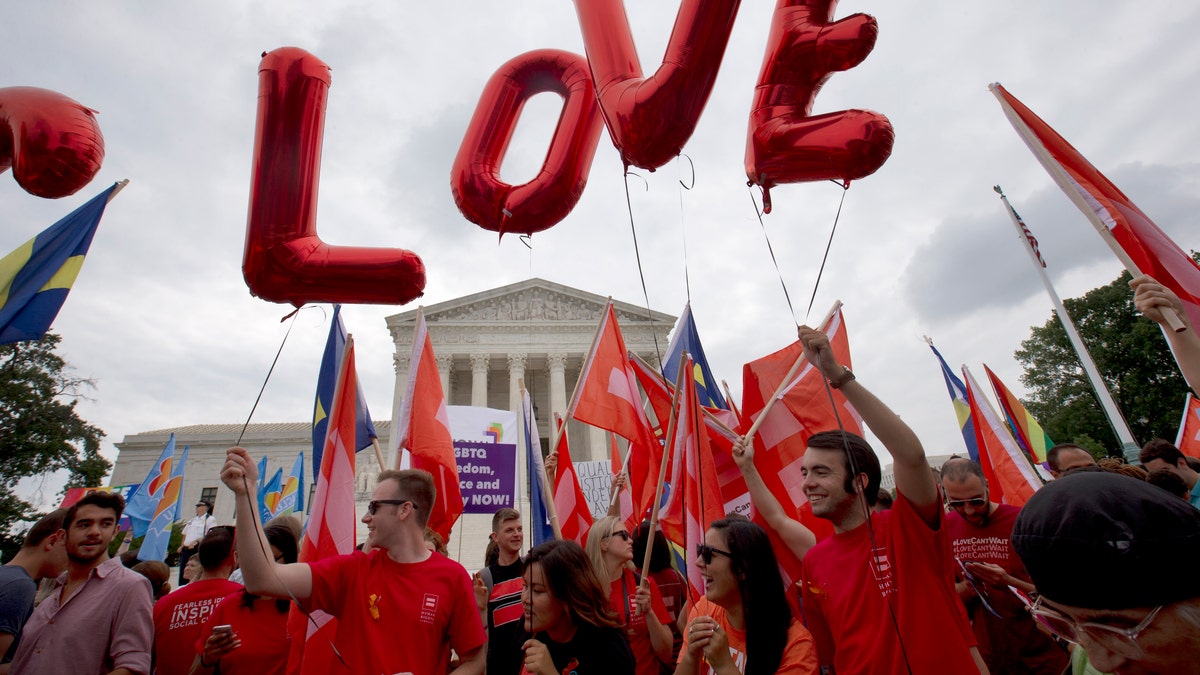
Balloons spell out the word "love" over the Supreme Court in Washington, Friday June 26, 2015, after the court declared that same-sex couples have a right to marry anywhere in the US. (AP Photo/Jacquelyn Martin)
In knocking down the last remaining barriers to same-sex marriage in the United States, the Supreme Court announced a conclusion that, according to every measure of public opinion, a substantial majority of Americans have already reached: there is no longer any justification for denying the dignity and protections of civil marriage to gays and lesbians.
The decision is consistent with the American constitutional principle that government must provide strong justification – that is, it must point to serious and concrete harms – before it denies a fundamental liberty such as the right to marry. On this point, the arguments of the states that continued to deny marriage equality were tested in the crucible of litigation, and they were found lacking in evidence and logic.
Until a few decades ago, the very idea of same-sex marriage seemed absurd, an oxymoron. But actual lived experience exposes erroneous premises and forces us to reconsider outdated assumptions and practices. As the great Supreme Court Justice Oliver Wendell Holmes famously observed, the “life of the law” is “experience,” and thus our law “embodies the story of a nation’s development through many centuries.”
Based on their everyday experience, most Americans have concluded that gay and lesbian families are no different than straight people in their ability to carry out the purposes and responsibilities of marriage. The Court’s decision Friday simply underscores that, lacking a sound basis for treating same-sex couples differently, the remaining laws against marriage equality served only to impose “stigma and injury” and to work “grave and continuing harm.”
The Court’s decision Friday was not elitist, anti-democratic or the product, as we will inevitably hear, of “activist judges.” It validated what social reality and everyday experience have already taught most of us: that it is unjust to deny basic legal rights to a group of people based on little more than outdated fears, stereotypes or ignorance.
Many states had already adopted marriage equality on their own accord. And so as a practical matter, Friday’s Supreme Court decision puts an end to the absurd crazy quilt of conflicting state marriage laws that meant a gay or lesbian couple could be considered legally married in one state but not in another. No sensible legal system could long tolerate such an unfair and dangerous regime in a large and mobile country.
The decision also makes children safer. An estimated 200,000 children are being raised by gay or lesbian couples. Those children now have the opportunity for the greater legal, financial and personal security and stability that come from being raised by legally married parents.
Throughout this debate, we have heard many assertions about the history of marriage. For the constitutional rights and liberties we Americans cherish, history and tradition are essential starting points that inform analysis. But in and of themselves, history and tradition cannot settle the difficult, real-world questions of how we order our society or decide to allocate legal rights and responsibilities.
And in any event, those facile assertions about the unchanging nature of marriage were incorrect. As the Court explained in its opinion today, “The ancient origins of marriage confirm its centrality” to our society and culture. But – as women in particular know all too well – the “history of marriage is one of both continuity and change. That institution – even as confined to opposite-sex relations – has evolved over time.” Moreover, the Court noted, “If rights were defined by who exercised them in the past, then received practices could serve as their own justification and new groups could not invoke rights once denied.”
Most Americans understand for themselves what makes a good marriage and a bad marriage; who models admirable marital behavior, and who doesn’t. Even in the states that continued to ban marriage equality until today, a majority had come around to favoring same-sex marriage.
And so in that sense, the Court’s decision Friday was not elitist, anti-democratic or the product, as we will inevitably hear, of “activist judges.” It validated what social reality and everyday experience have already taught most of us: that it is unjust to deny basic legal rights to a group of people based on little more than outdated fears, stereotypes or ignorance.
As the Court said in an earlier decision that struck down laws criminalizing homosexual conduct, “times can blind us to certain truths, and later generations can see that laws once thought necessary and proper in fact serve only to oppress.” Friday’s decision was a natural extension of that profound insight.
